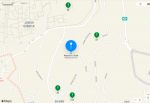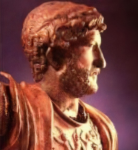THIRD TEMPLE NEWS
- Thread starter VCO
- Start date
-
Christian Chat is a moderated online Christian community allowing Christians around the world to fellowship with each other in real time chat via webcam, voice, and text, with the Christian Chat app. You can also start or participate in a Bible-based discussion here in the Christian Chat Forums, where members can also share with each other their own videos, pictures, or favorite Christian music.
If you are a Christian and need encouragement and fellowship, we're here for you! If you are not a Christian but interested in knowing more about Jesus our Lord, you're also welcome! Want to know what the Bible says, and how you can apply it to your life? Join us!
To make new Christian friends now around the world, click here to join Christian Chat.
So what happened near the end of the 1100's that set up a favorable return to Israel by the Jews. Something most people do not remember from History, is this war. Prior Sept 20, 1187, the TURKS had control of Jerusalem. When the JEWS had returned to Jerusalem, probably shortly before 1215, they needed something like a governing body to make decisions for them. Apparently it was not an Official SANHEDRIN, but it functioned like a Sanhedrin. There was not a lot Scribes or Historians that tried to record the history of that transition.
QUOTE:
Late in September Saladin's armies camped before the Holy City itself.
QUOTE:
Late in September Saladin's armies camped before the Holy City itself.
The Holy City of Jerusalem was besieged on September 20. It was surrounded on every side by unbelievers, who shot arrows everywhere into the air. They were accompanied by frightening armaments and, with a great clamor of trumpets, they shrieked and wailed, “Hai, hai.” The city was aroused by the noise and tumult of the barbarians {I assume that would be Germany.} and, for a time, they all cried out: ”True and Holy Cross! Sepulchre of Jesus Christ's resurrection! Save the city of Jerusalem and its dwellers!“
The battle was then joinedand both sides began courageously to fight. But since so much unhappiness was produced through sorrow and sadness, we shall not enumerate all the Turkish attacks and assemblies, by which, for two weeks, the Christians were worn down.... During this time it seemed that God had charge over the city, for who can say why one man who was hit died, while another wounded man escaped? Arrows fell like raindrops, so that one could not show a finger above the ramparts without being hit. There were so many wounded that all the hospitals and physicians in the city were hard put to it just to extract the missiles from their bodies. I myself was wounded in the face by an arrow which struck the bridge of my nose. The wooden shaft has been taken out, but the metal tip has remained there to this day. The inhabitants of Jerusalem fought courageously enough for a week, while the enemy settled down opposite the tower of David.
Saladin saw that he was making no progress and that as things were going he could do no damage to the city. Accordingly, he and his aides began to circle around the city and to examine the city's weak points, in search of a place where he could set up his engines without fear of the Christians and where he could more easily attack the town.... At dawn on a certain day [Sept 26] the King of Egypt (that is, Saladin) ordered the camp to be moved without any tumult or commotion. He ordered the tents to be pitched in the Vale of Jehosephat, on the Mount of Olives, and on Mount joy, and throughout the hills in that region. When morning had come the men of Jerusalem lifted up their eyes and, when the darkness of the clouds had gone, they saw that the Saracens were pulling up their tents as if they were going to leave. The inhabitants of Jerusalem rejoiced greatly and said: “The King of Syria has fled, because he could not destroy the city as be had planned.” When the turn of the matter was known, however, this rejoicing was quickly turned into grief and lamentation.
The tyrant [Saladin] at once ordered the engines to be constructed and balistas to be put up. He likewise ordered olive branches and branches of other trees to be collected and piled between the city and the engines. That evening he ordered the army to take up arms and the engineers to proceed with their iron tools, so that before the Christians could do anything about it, they would all be prepared at the foot of the walls. The cruelest of tyrants also arrayed up to ten thousand armed knights with bows and lances on horseback, so that if the men of the city attempted a foray they would be blocked. He stationed another ten thousand or more men armed to the teeth with bows for shooting arrows, under cover of shields and targets. He kept the rest with himself and his lieutenants around the engines.
When everything was arranged in this fashion, at daybreak they began to break down the comer of the tower and to attack all around the walls. The archers began shooting arrows and those who were at the engines began to fire rocks in earnest.
The men of the city expected nothing of the sort and left the city walls without guard. Tired and worn out, they slept until morning, for unless the Lord watch the city, he labors in vain who guards it. When the sun had risen, those who were sleep ing in the towers were startled by the noise of the barbarians. When they saw these things they were terrified and overcome with fear. Like madmen they yelled out through the city: “Hurry, men of Jerusalem! Hasten! Help! The walls have already been breached! The foreigners are entering!” Aroused, they hastened through the city as bravely as they could, but they were power less to repulse the Damascenes from the walls, either with spears, lances, arrows, stones, or with molten lead and bronze.
The Turks unceasingly hurled rocks forcefully against the ramparts. Between the walls and the outer defenses they threw rocks and the socalled Greek fire, which bums wood, stone, and whatever it touches. Everywhere the archers shot arrows without measure and without ceasing, while the others were boldly smashing the walls.
The men of Jerusalem, meanwhile, were taking counsel. They decided that everyone, with such horses and arms as could be mustered, should leave the city and march steadily through the gate which leads to Jehosephat. Thus, if God allowed it, they would push the enemy back a bit from the walls. They were foiled, however, by the Turkish horsemen and were woefully defeated….
The Chaldeans [Saladin and his army] fought the battle fiercely for a few days and triumphed. The Christians were failing so by this time that scarcely twenty or thirty men appeared to defend the city walls. No man could be found in the whole city who was brave enough to dare keep watch at the defences for a night, even for a fee of a hundred besants .With my own ears I heard the voice of a public crier between the great wall and the outer works proclaiming (on behalf of the lord Patriarch and the other great men of the city) that if fifty strong and brave sergeants could be found who would take up arms voluntarily and keep guard during the night over the comer which had already been destroyed, they would receive five thousand besants. They were not found....
Our people {I think this is referring to German Christians.} held the city of Jerusalem for some eighty-nine years. . . . Within a short time, Saladin had conquered almost the whole Kingdom of Jerusalem. He exalted the grandeur of Mohammed's law and showed that, in the event, its might exceeded that of the Christian religion.
Sources: De Expugatione Terrae Sanctae per Saladinum, [The Capture of the Holy Land by Saladin], ed. Joseph Stevenson, Rolls Series, (London: Longmans, 1875), translated by James Brundage, The Crusades: A Documentary History, (Milwaukee, WI: Marquette University Press, 1962), 159-63 on Internet Medieval Source Book
:END QUOTE.
-
1
- Show all
I did not know that the German Army laid claim to Jerusalem, for 89 years and they were the ones that allowed the JEWS to return to Jerusalem in early 1200's. I wonder if Adolf Hitler ever understood that?
QUOTE:
The wanderings of the Germanic peoples, which lasted until the early Middle Ages and destroyed the Western Roman Empire, were, together with the migrations of the Slavs, formative elements of the distribution of peoples in modern Europe. The Germanic peoples originated about 1800 bce from the superimposition, on a population of megalithic culture on the eastern North Sea coast, of Battle-Ax people from the Corded Ware Culture of middle Germany. During the Bronze Age the Germanic peoples spread over southern Scandinavia and penetrated more deeply into Germany between the Weser and Vistula rivers.
https://www.britannica.com/topic/history-of-Europe/Barbarian-migrations-and-invasions#ref524725
:END QUOTE.
I did know KNOW that, and you would think I would have been told that in my childhood, as I am 1/4 German in my heritage. Nothing was ever mentioned about Germany, other than that side of the family immigrated to the U.S. from a town in North Coast region of Germany. Apparently the Barbarians, and the Battle-Ax people, are a source of pride, for the same people. The Middle Ages were between 500 A.D. and 1500 A.D.

So these are the People, that allowed the JEWS to immigrate back to JERUSALEM after over a 1000 years in exile.
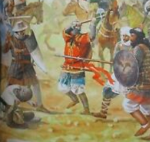
QUOTE:
The wanderings of the Germanic peoples, which lasted until the early Middle Ages and destroyed the Western Roman Empire, were, together with the migrations of the Slavs, formative elements of the distribution of peoples in modern Europe. The Germanic peoples originated about 1800 bce from the superimposition, on a population of megalithic culture on the eastern North Sea coast, of Battle-Ax people from the Corded Ware Culture of middle Germany. During the Bronze Age the Germanic peoples spread over southern Scandinavia and penetrated more deeply into Germany between the Weser and Vistula rivers.
https://www.britannica.com/topic/history-of-Europe/Barbarian-migrations-and-invasions#ref524725
:END QUOTE.
I did know KNOW that, and you would think I would have been told that in my childhood, as I am 1/4 German in my heritage. Nothing was ever mentioned about Germany, other than that side of the family immigrated to the U.S. from a town in North Coast region of Germany. Apparently the Barbarians, and the Battle-Ax people, are a source of pride, for the same people. The Middle Ages were between 500 A.D. and 1500 A.D.
Germany in the 10th and 11th centuries
Encyclopædia Britannica, Inc.
Encyclopædia Britannica, Inc.

So these are the People, that allowed the JEWS to immigrate back to JERUSALEM after over a 1000 years in exile.

I know that German's were not genuine Born Again Christians for the most Part. Back in the Middle Ages, they were most Lutherans or a similar denomination. I used to be one of those, that thought taking up space on pew, Infant Baptism, and doing something for the Church once in awhile, made me a Christian. It never involved genuine Born Again, a work of the Holy Spirit where HE Immersed me into the Spiritual Body of CHRIST, when out of Pure Love for Jesus Christ were I willingly surrender to HIM. KNOWING HE DID IT ALL, and Nothing I did gained anything toward my salvation. Even receiving HIM as LORD, was an act of the HOLY SPIRIT. So I am sure most Germans thought they were REAL CHRISTIANS, but in reality were not. But GOD Used them to Get HIS PEOPLE back in the Land of ISRAEL.
-
1
- Show all
I did not know that the German Army laid claim to Jerusalem, for 89 years and they were the ones that allowed the JEWS to return to Jerusalem in early 1200's. I wonder if Adolf Hitler ever understood that?
QUOTE:
The wanderings of the Germanic peoples, which lasted until the early Middle Ages and destroyed the Western Roman Empire, were, together with the migrations of the Slavs, formative elements of the distribution of peoples in modern Europe. The Germanic peoples originated about 1800 bce from the superimposition, on a population of megalithic culture on the eastern North Sea coast, of Battle-Ax people from the Corded Ware Culture of middle Germany. During the Bronze Age the Germanic peoples spread over southern Scandinavia and penetrated more deeply into Germany between the Weser and Vistula rivers.
https://www.britannica.com/topic/history-of-Europe/Barbarian-migrations-and-invasions#ref524725
:END QUOTE.
I did know KNOW that, and you would think I would have been told that in my childhood, as I am 1/4 German in my heritage. Nothing was ever mentioned about Germany, other than that side of the family immigrated to the U.S. from a town in North Coast region of Germany. Apparently the Barbarians, and the Battle-Ax people, are a source of pride, for the same people. The Middle Ages were between 500 A.D. and 1500 A.D.

So these are the People, that allowed the JEWS to immigrate back to JERUSALEM after over a 1000 years in exile.
View attachment 240061
QUOTE:
The wanderings of the Germanic peoples, which lasted until the early Middle Ages and destroyed the Western Roman Empire, were, together with the migrations of the Slavs, formative elements of the distribution of peoples in modern Europe. The Germanic peoples originated about 1800 bce from the superimposition, on a population of megalithic culture on the eastern North Sea coast, of Battle-Ax people from the Corded Ware Culture of middle Germany. During the Bronze Age the Germanic peoples spread over southern Scandinavia and penetrated more deeply into Germany between the Weser and Vistula rivers.
https://www.britannica.com/topic/history-of-Europe/Barbarian-migrations-and-invasions#ref524725
:END QUOTE.
I did know KNOW that, and you would think I would have been told that in my childhood, as I am 1/4 German in my heritage. Nothing was ever mentioned about Germany, other than that side of the family immigrated to the U.S. from a town in North Coast region of Germany. Apparently the Barbarians, and the Battle-Ax people, are a source of pride, for the same people. The Middle Ages were between 500 A.D. and 1500 A.D.
Germany in the 10th and 11th centuries
Encyclopædia Britannica, Inc.
Encyclopædia Britannica, Inc.

So these are the People, that allowed the JEWS to immigrate back to JERUSALEM after over a 1000 years in exile.
View attachment 240061
Reporting indicates it is increasing many fold annually......referred to as ....aliyah.
I conclude you refer to Jerusalem as Israeli land as we know it today.
Warren's Shaft Exit, may be in that group of trees, below. If that is the case, it may not be in the Temple itself. Running a channel (gutter system) would be easy enough on Level Ground over to the TEMPLE. AND IT HAD TO BE LEVEL GROUND TO BE A LARGE THRESHING FIELD. The red Circle is where the Map above is places the Warren's Shaft Exit, if it is accurate. By the way, there is NO level ground that large anywhere on the Temple Mount.
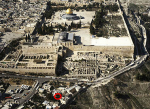

-
1
- Show all
So the Red Heifer Sacrifice happens first, before they can build the Temple. They think it could happen as soon as Oct. 4, this year.
So even if they build it on the Wrong Site, it only means GOD was not involved with it.

MORE Proof that Moriah was the name of the WHOLE RIDGE. " In the REGION of MORIAH", not on TOP of Moriah.
And Here is what King Solomon BUILT on the OPHEL:

I know, only the NIV and Amplified Bible translates the word REGION of Moriah, and other versions translate it Land of Moriah.
I think the NIV GOT IT RIGHT, as Land of Moriah makes little sense to me, but REGION of Moriah makes a whole lot of sense.
So even if they build it on the Wrong Site, it only means GOD was not involved with it.

MORE Proof that Moriah was the name of the WHOLE RIDGE. " In the REGION of MORIAH", not on TOP of Moriah.
And Here is what King Solomon BUILT on the OPHEL:

I know, only the NIV and Amplified Bible translates the word REGION of Moriah, and other versions translate it Land of Moriah.
I think the NIV GOT IT RIGHT, as Land of Moriah makes little sense to me, but REGION of Moriah makes a whole lot of sense.
-
1
- Show all
QUOTE:
. . .
“Then he called for Solomon his son, and charged him to build an house for theLord God of Israel. And David said to Solomon, My son, as for me, it was in my mind to build an house unto the name of the Lord my God: But the word of the Lord came to me, saying, Thou hast shed blood abundantly, and hast made great wars: thou shalt not build an house unto my name, because thou hast shed much blood upon the earth in my sight. Behold, a son shall be born to thee, who shall be a man of rest; and I will give him rest from all his enemies round about: for his name shall be Solomon, and I will give peace and quietness unto Israel in his days. He shall build an house for my name; and he shall be my son, and I will be his father; and I will establish the throne of his kingdom over Israel for ever.” – 1 Chronicles 22:1-10.
. . .
Zion is mentioned over 300 times in Scripture! This staggering amount reflects its tremendous spiritual importance. Why? Because it is where God chose to dwell during the 40 year reign of David (in the tabernacle) and in the subsequent temples of Solomon and the Second Temple.
Many believers today consider Zion and Jerusalem interchangeable terms when in fact they are not. Zion is the City of David, located within Jerusalem:
:END QUOTE.
. . . . . . . . . . . . . . . . . . . . . . . . . . . . . . . . . . . . . . . . . . . . . . . . . . . . . . . . . . . . . . . . . . . . . . . . . . HIGHER HILL.
. . .
“Then he called for Solomon his son, and charged him to build an house for theLord God of Israel. And David said to Solomon, My son, as for me, it was in my mind to build an house unto the name of the Lord my God: But the word of the Lord came to me, saying, Thou hast shed blood abundantly, and hast made great wars: thou shalt not build an house unto my name, because thou hast shed much blood upon the earth in my sight. Behold, a son shall be born to thee, who shall be a man of rest; and I will give him rest from all his enemies round about: for his name shall be Solomon, and I will give peace and quietness unto Israel in his days. He shall build an house for my name; and he shall be my son, and I will be his father; and I will establish the throne of his kingdom over Israel for ever.” – 1 Chronicles 22:1-10.
. . .
“Sing praises to the Lord, which dwelleth in Zion: declare among the people his doings.” – Psalm 9:11.
“Out of Zion, the perfection of beauty, God hath shined.” – Psalm 50:2.
“Remember thy congregation, which thou hast purchased of old; the rod of thine inheritance, which thou hast redeemed; this mount Zion, wherein thou hast dwelt. Lift up thy feet unto the perpetual desolations; even all that the enemy hath done wickedly in the sanctuary.” – Psalm 74:2-3.
Zion is mentioned over 300 times in Scripture! This staggering amount reflects its tremendous spiritual importance. Why? Because it is where God chose to dwell during the 40 year reign of David (in the tabernacle) and in the subsequent temples of Solomon and the Second Temple.
Many believers today consider Zion and Jerusalem interchangeable terms when in fact they are not. Zion is the City of David, located within Jerusalem:
:END QUOTE.
. . . . . . . . . . . . . . . . . . . . . . . . . . . . . . . . . . . . . . . . . . . . . . . . . . . . . . . . . . . . . . . . . . . . . . . . . . HIGHER HILL.
ZION is South of the TEMPLE MOUNT, not the mis-identified Mt. Zion that lies south-west of the Temple Mount.
-
1
- Show all
I want to show the skeptics something. Here is a modern photo of the so-called Temple Mount:
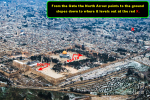
Even the ground where Raised platform that supports the Dome of the Rock sits, is Sloped. That grounds slopes down from the Gate that I pointed to, through the North Gate, and all the way down to the RED X, before it Levels out for a ways. Man made raised Floor:

Here is a photo of the of what lies under the Dome of the Rock:

This LARGE Protruding Bedrock is the Highest Point of on that HILL. Everything else is DOWN HILL.
Which BRINGS US to my Main Point, a THRESHING FLOOR HAS TO BE LEVEL, Especially one that COST:
1 Chronicles 21:25
24“No,” replied King David, “I insist on paying the full price, for I will not take for the LORD what belongs to you, nor will I offer burnt offerings that cost me nothing.” 25 So David paid Ornan six hundred shekels of gold for the site. 26And there he built an altar to the LORD and offered burnt offerings and peace offerings. He called upon the LORD, who answered him with fire from heaven on the altar of burnt offering.…
Berean Study Bible · Download
That was a VERY LARGE Threshing Floor, WAY LARGER THAN THIS ONE:
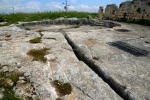
It may have been larger that this Double one:
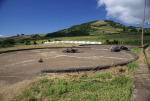
The only flat Bedrock large enough to house the TEMPLE in the Jerusalem area, is the OPHEL.

Even the ground where Raised platform that supports the Dome of the Rock sits, is Sloped. That grounds slopes down from the Gate that I pointed to, through the North Gate, and all the way down to the RED X, before it Levels out for a ways. Man made raised Floor:

Here is a photo of the of what lies under the Dome of the Rock:

This LARGE Protruding Bedrock is the Highest Point of on that HILL. Everything else is DOWN HILL.
Which BRINGS US to my Main Point, a THRESHING FLOOR HAS TO BE LEVEL, Especially one that COST:
1 Chronicles 21:25
24“No,” replied King David, “I insist on paying the full price, for I will not take for the LORD what belongs to you, nor will I offer burnt offerings that cost me nothing.” 25 So David paid Ornan six hundred shekels of gold for the site. 26And there he built an altar to the LORD and offered burnt offerings and peace offerings. He called upon the LORD, who answered him with fire from heaven on the altar of burnt offering.…
Berean Study Bible · Download
That was a VERY LARGE Threshing Floor, WAY LARGER THAN THIS ONE:

It may have been larger that this Double one:

The only flat Bedrock large enough to house the TEMPLE in the Jerusalem area, is the OPHEL.
-
1
- Show all
This it JUST the Temple it self, without Courtyards, or other building, or outer Walls included.
1 Kings 6:1-2 (NCV)
1 Solomon began to build the Temple four hundred eighty years after the people of Israel had left Egypt. This was during the fourth year of King Solomon’s rule over Israel. It was the second month, the month of Ziv.
2 The Temple was ninety feet long, thirty feet wide, and forty-five feet high.
That is the Minimum that the Threshing Floor, had to be. That is how come the Threshing Floor had to be a Triple at least. Three Circles 30 wide, back to back.
But even that does not account for High Price of six hundred shekels of gold for the land. So I think the flat top of Mt. Zion was much larger. Perhaps as large as the entire Complex.
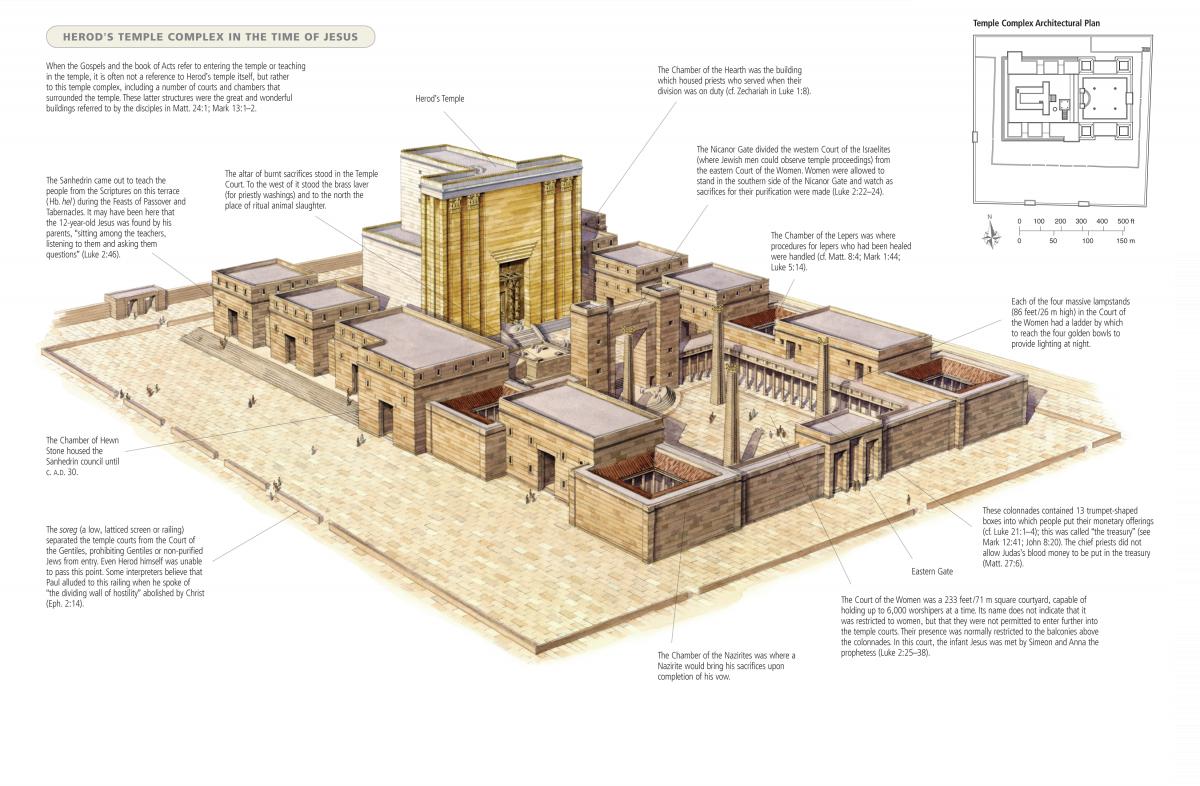
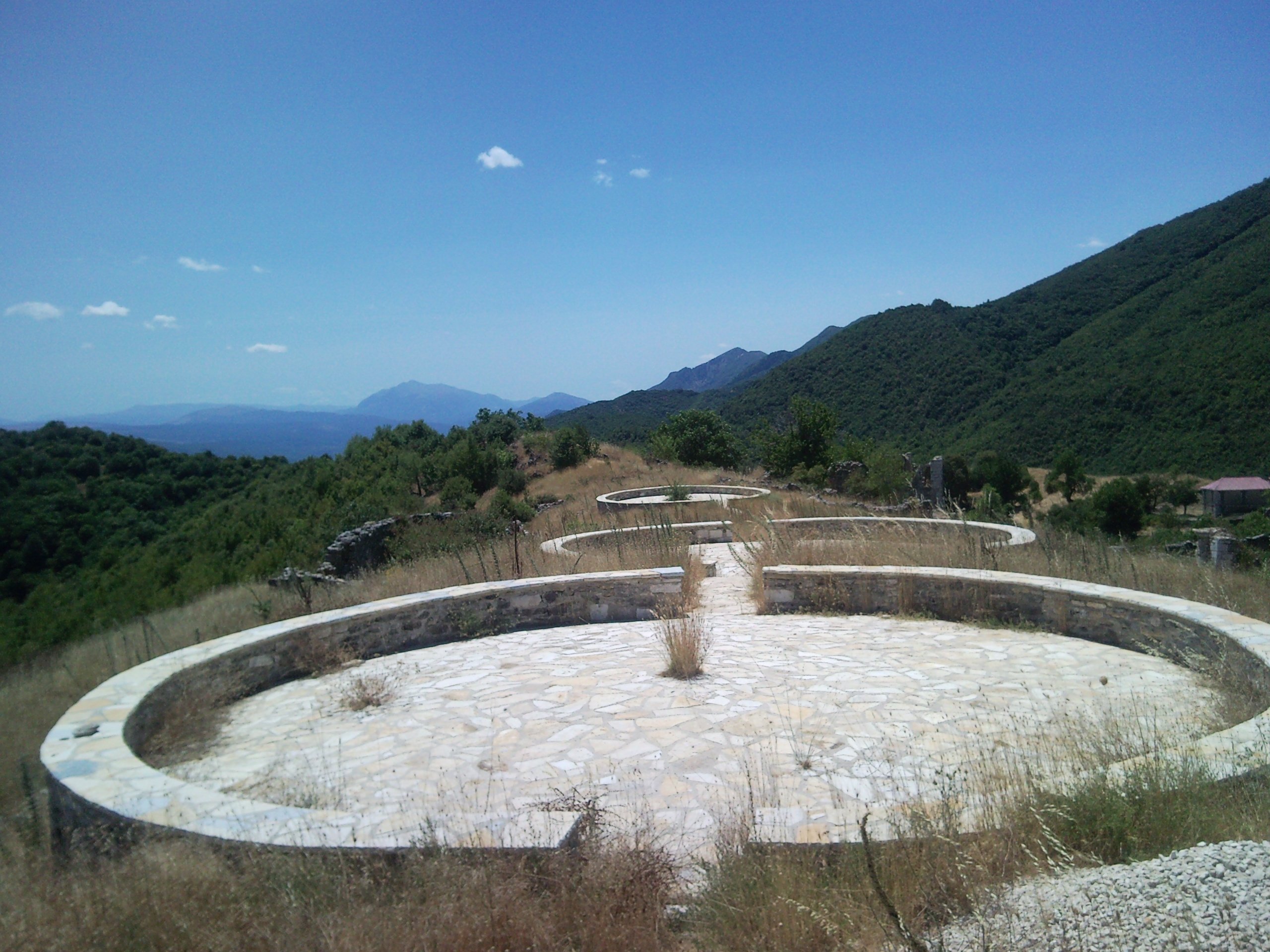
Now try to find a place that big on the Temple Mount. It is all sloping from the Protruding Rock up top. AND those circles loo less that 30 feet wide to me.
1 Kings 6:1-2 (NCV)
1 Solomon began to build the Temple four hundred eighty years after the people of Israel had left Egypt. This was during the fourth year of King Solomon’s rule over Israel. It was the second month, the month of Ziv.
2 The Temple was ninety feet long, thirty feet wide, and forty-five feet high.
That is the Minimum that the Threshing Floor, had to be. That is how come the Threshing Floor had to be a Triple at least. Three Circles 30 wide, back to back.
But even that does not account for High Price of six hundred shekels of gold for the land. So I think the flat top of Mt. Zion was much larger. Perhaps as large as the entire Complex.


Now try to find a place that big on the Temple Mount. It is all sloping from the Protruding Rock up top. AND those circles loo less that 30 feet wide to me.
-
1
- Show all
I used to think the Jews had the Temple Mount correct. Now, it seems they have almost everything Wrong, mostly because of one or two errors. They got the idea that everything had to be on the Highest Hill, and they forgot that the ruler Prince Simon bar Kokhba had Ordered the in 132 A.D., that the REAL Mt. Zion, be almost leveled because the Roman's put a Temple to Jupiter, on the REAL Temple site, on the OPHEL. Because he wanted to build the Third Temple, and the Temple to Jupiter had defiled the Bedrock. YES, they remembered that Prince Simon Kicked the ROMAN's 10th Legion out of Jerusalem, but three years later they CAME back with 10 Legions. and killed Prince Simon, and all of his men 135 A.D. So there was almost no Sign remaining of Mt. ZION being south of the TEMPLE MOUNT on the OPHEL; so the Sanhedrin voted to proclaim the Wrong mountain {Mt. Zion} in 1215 A.D.
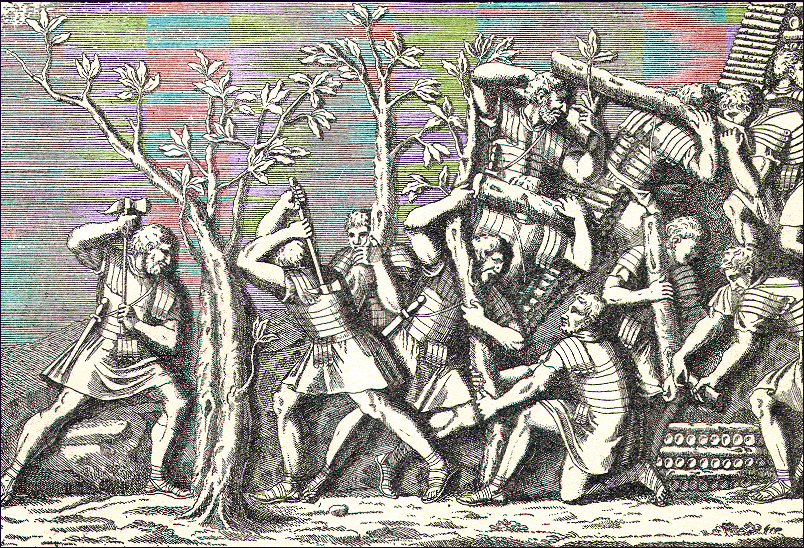
So Mt. Zion was almost leveled.
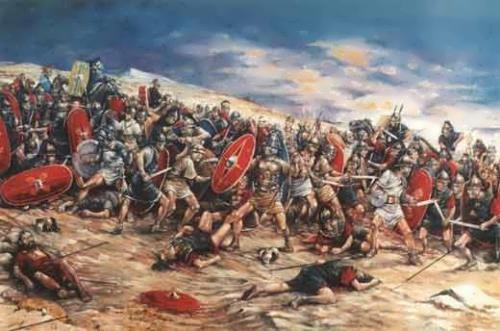

Last stand of Prince Simon bar Kokhba. . . . . . . . . . . . . . . . . . . . . . . . . . . . . . .Prince Simon bar Kokhba reigned for only 3 years.

So Mt. Zion was almost leveled.


Last stand of Prince Simon bar Kokhba. . . . . . . . . . . . . . . . . . . . . . . . . . . . . . .Prince Simon bar Kokhba reigned for only 3 years.
Not sure who or when that lower left paint was done. It showed up in a search Simon bar Kokhba in pictures. So I think the Body in the lower left corner is supposed to be Simon bar Kokhba, as in historical record they think the death blow was in the left side. Obviously the Final war with the Romans was put an end to his plans to build the Third Temple. But the workers or soldiers he hired to remove the Bedrock from the real Mt. Zion, had all but finished their Job, making ready to build the Third Temple.
Another Big Mistake the Jews made was totally ignoring Flavious Josephus, the Jewish historian that lived from 37 AD to 100 AD.

Their excuse for ignoring him, was that he just exaggerates. I have found no exagerations in his writings. I think the ONE truth that started the JEWS falsely thinking he exagerates, was his reporting that the Romans built a DOUBLE two story Causway Bridge (Colonnades) to get troops from the Fortress Antonia to the Temple in a HURRY if the JEWS started a REBELLION, and the bridges where about 600 feet long. It looks something like this:
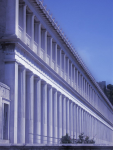 Troops could run on top and on the second floor with two bridges, that had FOUR COLUMNS OF TROOPS charging toward the Upper Outer Wall of the TEMPLE to the south. Josephus even discribed a Rebellion that met the ROMANS in the middle of those Causeways. Becuase of the Stables were in the southeast corner Fortress Antonia, and these 600 foot Double Causeway were running from the southwest corner south to the lower hill of the TEMPLE, the OPHEL. The Jews wanted to believe the Temple was on the highest hill, so badly, they chose the ignore what their historian and said was the TRUTH. So because of the horse traffic to the stables it may have looked more like these drawings:
Troops could run on top and on the second floor with two bridges, that had FOUR COLUMNS OF TROOPS charging toward the Upper Outer Wall of the TEMPLE to the south. Josephus even discribed a Rebellion that met the ROMANS in the middle of those Causeways. Becuase of the Stables were in the southeast corner Fortress Antonia, and these 600 foot Double Causeway were running from the southwest corner south to the lower hill of the TEMPLE, the OPHEL. The Jews wanted to believe the Temple was on the highest hill, so badly, they chose the ignore what their historian and said was the TRUTH. So because of the horse traffic to the stables it may have looked more like these drawings:
 .
.
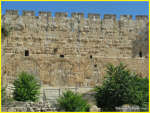
Notice the 5 doorways to the right of Colonnades were on the Second Level, and the Third Level above it. AND the First Level third doorway to the right, led to the Stables. Remnants of those doorways are still there, and PROOF POSITIVE it never was the right location of the large Threshing Floor that Ornan sold to King David.

Their excuse for ignoring him, was that he just exaggerates. I have found no exagerations in his writings. I think the ONE truth that started the JEWS falsely thinking he exagerates, was his reporting that the Romans built a DOUBLE two story Causway Bridge (Colonnades) to get troops from the Fortress Antonia to the Temple in a HURRY if the JEWS started a REBELLION, and the bridges where about 600 feet long. It looks something like this:
 Troops could run on top and on the second floor with two bridges, that had FOUR COLUMNS OF TROOPS charging toward the Upper Outer Wall of the TEMPLE to the south. Josephus even discribed a Rebellion that met the ROMANS in the middle of those Causeways. Becuase of the Stables were in the southeast corner Fortress Antonia, and these 600 foot Double Causeway were running from the southwest corner south to the lower hill of the TEMPLE, the OPHEL. The Jews wanted to believe the Temple was on the highest hill, so badly, they chose the ignore what their historian and said was the TRUTH. So because of the horse traffic to the stables it may have looked more like these drawings:
Troops could run on top and on the second floor with two bridges, that had FOUR COLUMNS OF TROOPS charging toward the Upper Outer Wall of the TEMPLE to the south. Josephus even discribed a Rebellion that met the ROMANS in the middle of those Causeways. Becuase of the Stables were in the southeast corner Fortress Antonia, and these 600 foot Double Causeway were running from the southwest corner south to the lower hill of the TEMPLE, the OPHEL. The Jews wanted to believe the Temple was on the highest hill, so badly, they chose the ignore what their historian and said was the TRUTH. So because of the horse traffic to the stables it may have looked more like these drawings: .
.

Notice the 5 doorways to the right of Colonnades were on the Second Level, and the Third Level above it. AND the First Level third doorway to the right, led to the Stables. Remnants of those doorways are still there, and PROOF POSITIVE it never was the right location of the large Threshing Floor that Ornan sold to King David.

I'd love to see the new temple. I wonder if I'll ever get the chance!
Me too! HE may allow us to get to see the start of it, But my understanding is we got a very important event in HEAVEN that is way more important: "We are invited to attend the Wedding of the Lamb."
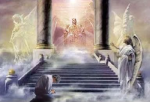 .
.

However, There is a Fourth Temple, that Christ Himself will BUILD. It is not in Jerusalem, it is on :

On the Chebar River HE will build a fourth Temple, way bigger that the Third Temple.
Ezekiel 43:1-7 (ASV)
1 Afterward he brought me to the gate, even the gate that looketh toward the east.
2 And, behold, the glory of the God of Israel came from the way of the east: and his voice was like the sound of many waters; and the earth shined with his glory.
3 And it was according to the appearance of the vision which I saw, even according to the vision that I saw when I came to destroy the city; and the visions were like the vision that I saw
BY THE RIVER CHEBAR; and I fell upon my face.
4 And the glory of Jehovah came into the house by the way of the gate whose prospect is toward the east.
5 And the Spirit took me up, and brought me into the inner court; and, behold, the glory of Jehovah filled the house.
6 And I heard one speaking unto me out of the house; and a man stood by me.
7 And he said unto me, Son of man, this is the place of my throne, and the place of the soles of my feet, where I will dwell in the midst of the children of Israel for ever. And the house of Israel shall no more defile my holy name, neither they, nor their kings, by their whoredom, and by the dead bodies of their kings in their high places;
That is called Ezekial's Prophesied TEMPLE, and it has to be the FOURTH TEMPLE.
-
1
-
1
- Show all

